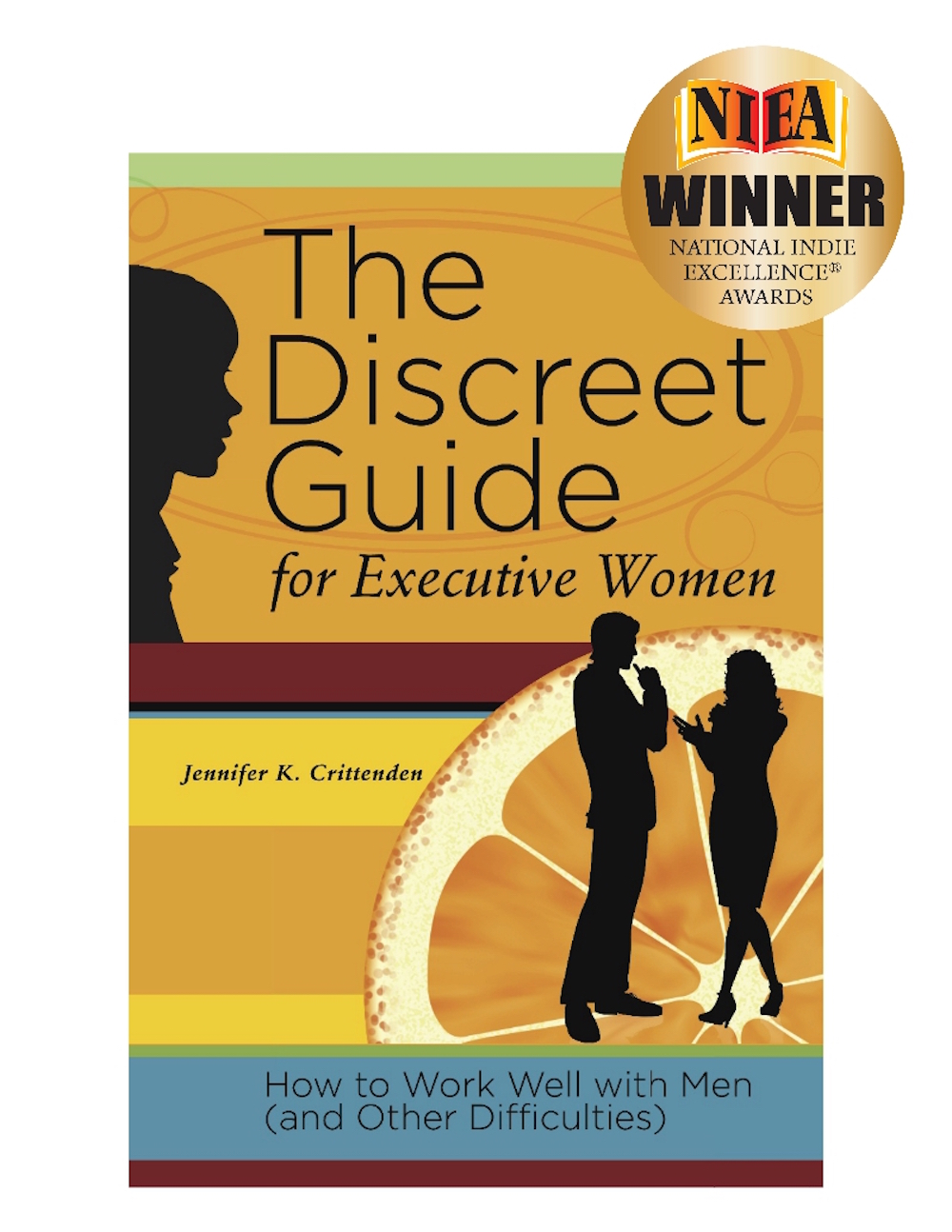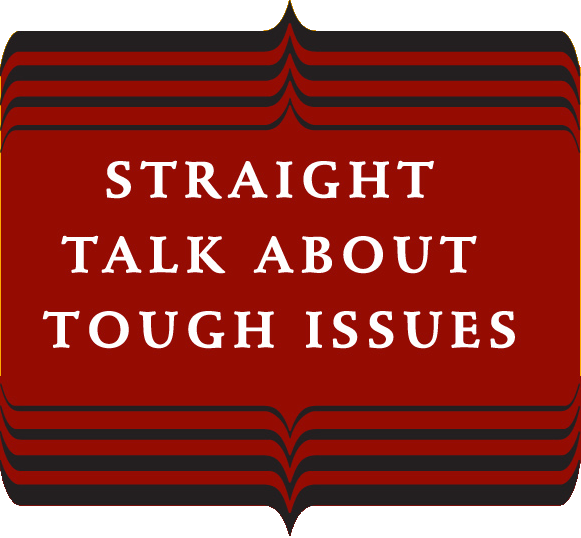Thanks to the statistical package installed on my website, discreetguide.com, I can see what search terms my soon-to-be fans have used to find it. I casually take note of these search terms and reflect on the people behind them. The majority of visitors have googled something about a male-dominated environment. Some are looking for a laugh, a women’s group, or a hookup. Sometimes, however, a visitor has used a search term that provides such insight into her situation that I feel compelled to take action, even criminal action.
To look at the more mundane first, the search term “discreet” seems to be internet code for “sex,” so men looking for a little adventure with “discret female executives,” or “discrete,” or “discreit”—it seems none of these guys can spell— must be startled when they end up on a website of advice about how to work with men, without sleeping with them. Do they think The Discreet Guide for Executive Women represents one of those binders full of hot women? They probably can’t click away fast enough.
I have also uploaded a comprehensive list of San Diego’s networking groups for women on my site, and many of my visitors land there first. To my surprise, with no regard for SEO and no attempt to drive traffic to that page, my website is Google’s first listing for search terms related to “San Diego women’s groups.” The usefulness of that page makes me proud and somewhat suspicious of all the advice about getting “hits.” If you build good content, they will come.
A lot of the website traffic is because of jokes. Stemming from my analysis of workplace humor, I created a page on jokes and included some funny, clever jokes. I was amused to see how frequently a new visitor would head straight for the Jokes tab after landing on the home page. It seemed like the Google equivalent of coming into someone’s office for a meeting and starting things off by helping oneself to a jellybean. Then I realized that people were Googling expressions like, “appropriate jokes to tell women,” “jokes for female executives,” or “good jokes for a presentation to women.” Deducing that these searchers were nervously looking for jokes they could use without offending someone, I realized I had a responsibility. I started actively looking for genuine, funny jokes that weren’t mean to women. I built out the Jokes page and wrote a series of articles about workplace humor. Humor is a great tool in building connections with people, but it doesn’t work if you antagonize your audience or employees. There is a tremendous amount of vicious humor on the internet. It is infuriating to read some poor girl writing for help about how to counter some small-minded, nasty sexist jab. “What should I come back with?” she writes. And the heartless goons think it’s hilarious to reply, “You better come back with a sandwich.” So, my jokes page is an attempt to bring some civility back into the world, and there is an audience for that, thank God.
It also works the other way; a woman searching for something silly like “stiletto heels for executives” ends up reading a serious (well, to the extent that anything on my website is serious) article on executive presence. Or someone who puts in the search term “young woman executive hair” lands on a page about female leadership. I’m always hopeful that they gained something that will help them more than a new pair of shoes or a haircut.
Then, there are always the perplexing searches, such as, “how to use the word fuck in a discreet way”—huh? I don’t know if the visitor found anything useful on my website specific to that query, but maybe he or she found a good joke.
That said, by far, the majority of the search terms are related to male-dominated environments, “how to work with men,” “women in mostly-male environment,” “career advice for industry dominated by men,” “tips for working in all-male office,” “navigating a male-dominated meeting,” “how women are dominated by men in politics and business,” “interview tips for male-dominated company,” and so forth. It’s surprising how many of these queries are followed by “serious,” as in “what must lady do in male-dominated environment-serious,” or “being a girl in a all guy work environment serious,” as though the searcher is already braced for a putrid blast of misogynist internet humor.
Some search terms are more specific and provide some insight into what we’re up against. Examples include: “How come it is hard for me to interact in male dominant work environments,” or “what do male bosses think talking to women juniors,” or “female executive and insecurity.” Others raise some questions: “he can’t focus in the presence of women,” or “perception of women in male dominated work environment-serious,” or “would you recommend that a woman stay authentic even if working in a male dominated company,” or “should a woman have lunch with her male boss.” And some raise some alarm bells: “girls get cut out of business deals,” or “feeling upset with male dominant at work.” These are all people you want to help. I’m not so sure about the one who Googled: “how to use being a woman in a male-dominated environment,” or the one who searched for “how to brand yourself as a scintillate lady” but they probably shares some problems with the other searchers.
Occasionally, I see that a visitor has arrived on the site, with a special new search term, and my heart goes out to her. “I’m the only woman in the office why won’t they talk to me,” Googled one poor sister. That hurt. I hope she found some good advice to deal with that situation. Another typed “Why would a man take an international assignment when he tells me he cares for me.” My website doesn’t have any specific advice for that one, but at least she arrived at a sympathetic place.
A few days ago, a woman searched ‘”i’m the only woman in a male-dominated office and they talk badly about me.” That one made me mad. Imagining the male behavior that would prompt this woman to seek help online about a toxic office environment really ticked me off. I thought about the guys’ mean comments, nasty chuckles, and adolescent savagery, and steam started to come out of my ears. Then I had a brilliant idea.
It occurred to me that I could use these data to TAKE DOWN SOME BAD GUYS. I could become a woman of action instead of a mild-mannered writer. Instead of being endlessly frustrated by the lack of progress of female executives, I could take the fight to the office. Suppose I developed a Defense Against the Dark Snarks team. When a woman Googled that kind of plea for help, I would track her IP address using GeoLocator and gather my team outside her company’s door to do a little gender equality schooling.
How satisfying would it be to pound on the door and yell, “Gender Equality Police! Open up.” And as we bang through the door, Kate Beckett-style, we catch the bad guys red-handed, bullying the poor lone woman. Of course we are big and loud and tough. We move quickly into action and start banging heads, as the searcher points out the offenders. “HEY! Are you guys being mean to this woman?” Imagine her astonishment and delight as the team starts making the rounds of the bad guys with some verbal smacking around: “Are you making fun of her? You think that’s funny? Yeah? Who’s funny now? Huh?”
This delicious fantasy culminates with the guys shuffling their feet in shame and looking at the woman with new-found respect. Ha! Now that’s what I’m talking about. Think about the woman’s sense of empowerment as she wonders just how we knew that she was in trouble. After we have enjoyed as much contrition from the guys as we can stand, we prepare to leave. As we pass through the door, I say to her, “Now you just Google us again if you need anything.” And she nods happily and returns to her work with her back straight and her head up. Wouldn’t that be GREAT?!
Some rational part of my brain points out that my little initiative might face some legal hurdles. I can only imagine what charges a creative attorney would file against me following such an assault. Maybe I could just go for calling the bad guys out by blasting Phil Collins’ I KNOW WHAT YOU DID outside their door. Or sending an embarrassing howler à la Harry Potter that flies around the office shrieking and scolding. Or leave a card hanger on the door that says, “Sorry we missed you. We’ll be back.—The Gender Equality Police.” But, even then, there are likely to be some technical hurdles, as well as some privacy issues, in case some women don’t want me fighting their battles. Plus the NSA wouldn’t like me cutting into their turf. After a few more rational thoughts, I sadly put my fantasy aside. Sure would be fun though.
© 2015 Jennifer K. Crittenden





 Ten 90-minute individualized sessions. Private and confidential.
Ten 90-minute individualized sessions. Private and confidential.

